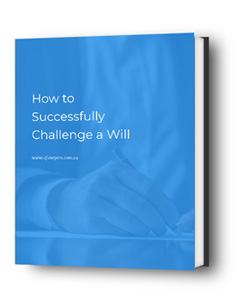How You Can Challenge a Will
If there’s a will, is there a way?
If you are left out of a will or believe you have been inadequately provided for financially, you may have grounds to challenge a will. But you will need to meet certain legal requirements within a strict time frame in order to contest a will.
Who can challenge?
In Queensland only a spouse, a child (including an adopted or step child), or a dependant of a deceased person can contest a will.
The definitions of who is a ‘spouse’, a ‘child’ or a ‘dependant’ are complex and a potential Claimant must bring themselves within the meaning of those terms as defined in the Succession Act 1981.
What does the court consider when assessing a challenge?
To contest a will, you need to make a ‘Family Provision Claim’ that shows that the deceased did not make reasonable financial provision for you in their will. Determining what is a reasonable financial provision can vary for different people depending on their circumstances. However, in determining what is reasonable, the court will look at the circumstances that exist when the court hears the application. To work out whether you have grounds to contest a will, the court considers a number of factors, including:
- your financial needs and resources
- the deceased’s obligations and responsibilities to you
- the size and nature of the estate of the deceased
- your conduct and the conduct of the deceased prior to their death.
In Queensland, if you notify the will’s executor in writing that you consent to the distribution of the Estate or that you do not intend to make an Application to the court that would affect distribution of the Estate, then you are not permitted to contest the will.

Bonus: Download these tips as a convenient pdf
Does timing matter?
Yes! There are very strict time limits involved in contesting a will.
An application to a court for “reasonable financial provision” must be issued within nine months from the date of death, unless permission is sought and given by the court. If you do not provide notice of intention to make a ‘family provision claim’ within six months from the date of death, the will’s executor may distribute the Estate without considering your claim.
The court can grant extensions if you were not aware of the deceased’s death, were unaware of your right to claim a provision, or if you were under a legal disability.
Is it worth contesting a will for a small estate?
Probably not. Some estates are so small that it is difficult to justify the risk and expense of litigation. For that reason courts often discourage family provision applications where small estates are involved.
What can the court decide?
If you can prove that your claim is legally valid by meeting all the court’s requirements, a court can determine what you are entitled to. Court orders can range from interim orders which are orders the court makes before it makes its final judgement, to periodical payments or the provision of gifts made under the will.
Is there any property that cannot be claimed?
Property that does not form part of the deceased’s estate cannot be subject to a legal challenge. This includes:
- property such as land or bank accounts held under joint tenancy, where there is an automatic right of survivor ship
- superannuation, where the deceased was a member and
- proceeds of certain life insurance policies.
Protect your interests
Rules for contesting wills regularly change. For example, there have been changes to the definition of ‘spouse’ to include same-sex partners and defacto partners, and changes have also been made to the meaning of the words ‘step children’ in response to changing international conventions that deal with the rights of children and adopted children. The process is further complicated by the impact of decisions made by courts in different parts of Australia and the fact that different laws apply in each Australian state and territory.
Get the right advice and representation
Colville Johnstone Lawyers have a dedicated team who are experienced representing clients who either challenge Wills or defend an action challenging a Will.
No matter the jurisdiction of the action or the size of the estate, Colville Johnstone Lawyers have the necessary legal expertise and experience to provide clients with the right advice and quality representation.
Contact us today for an obligation-free chat about your situation and the options you have. Call us at 07 3286 4077 or click here to email us.

Bonus: Download these tips as a convenient pdf

